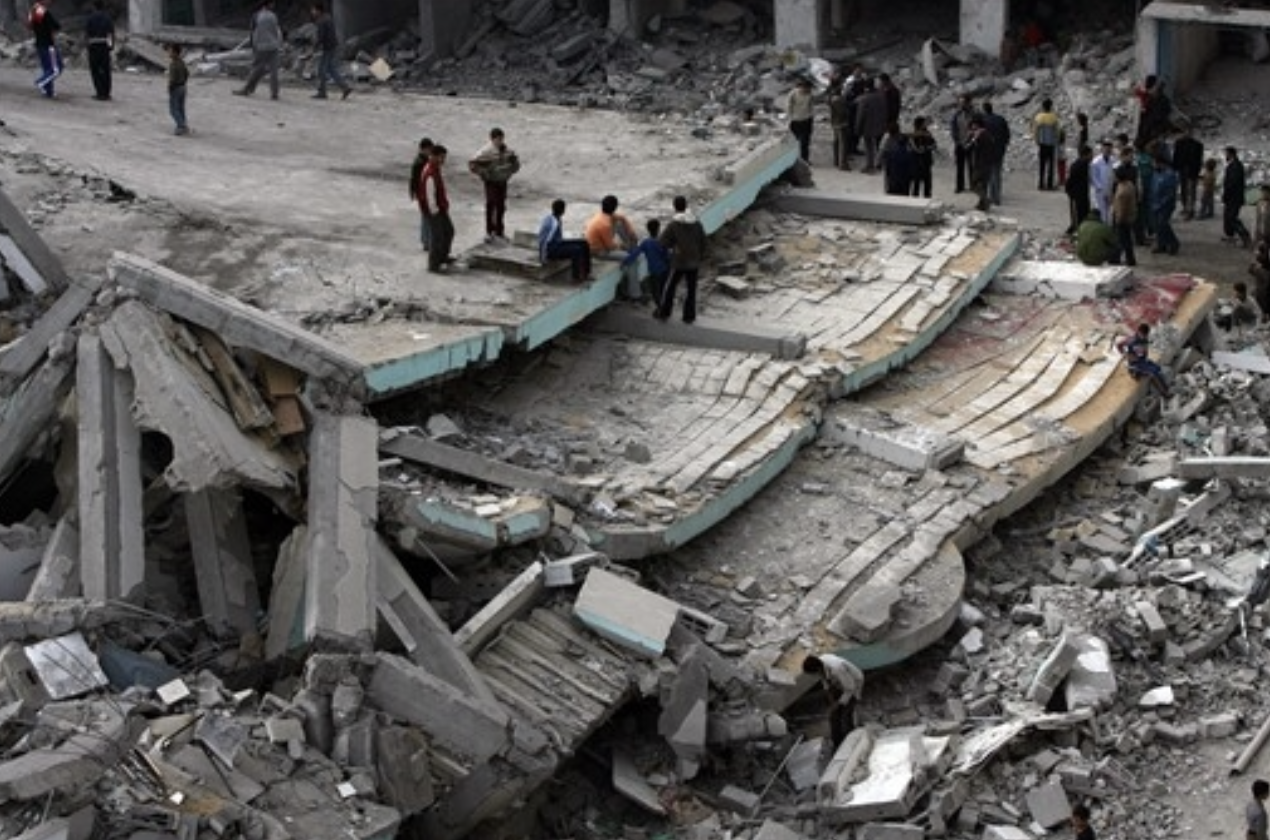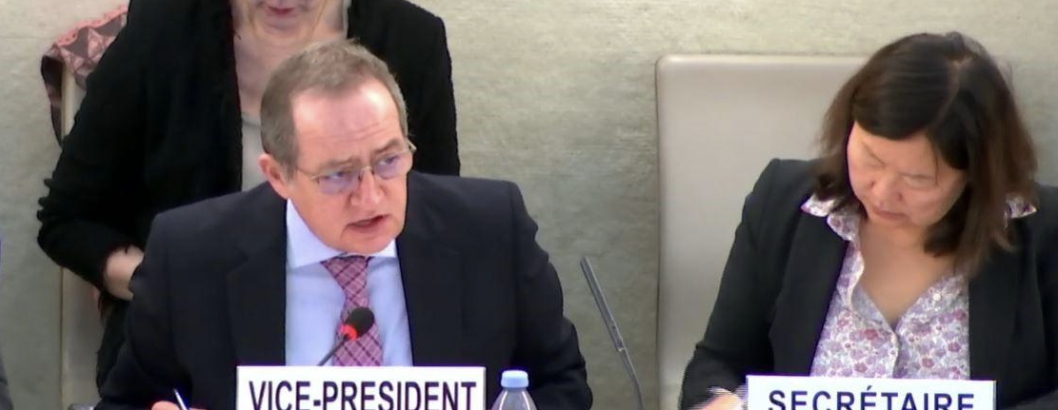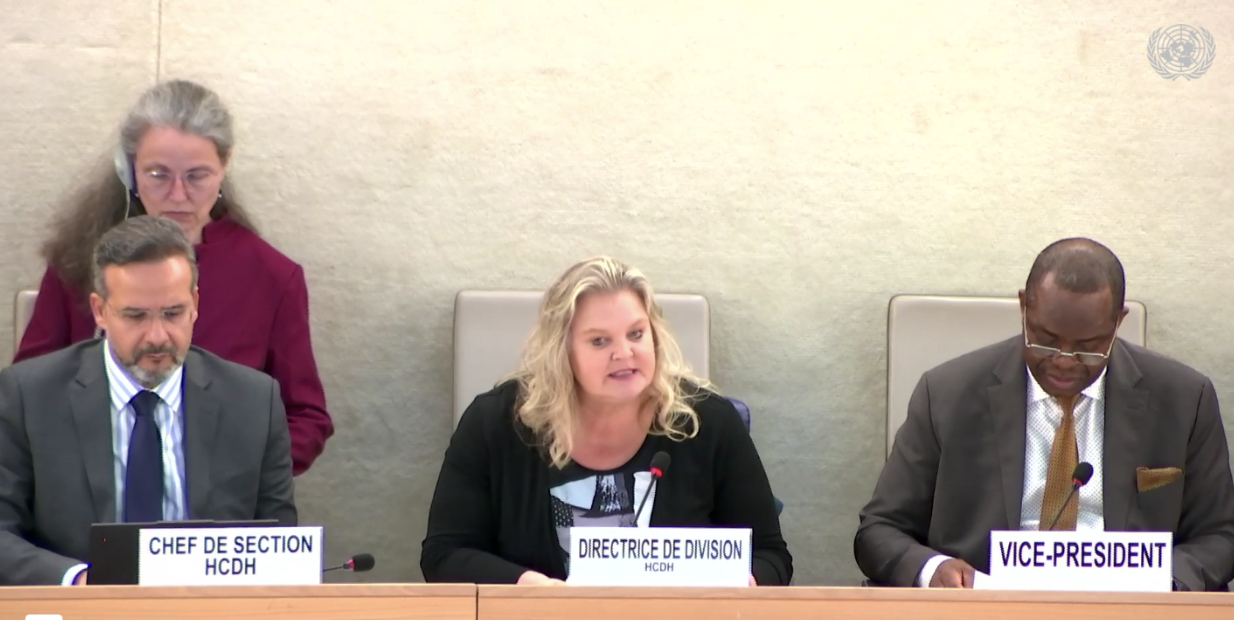The 57th Session of the Human Rights Council
9 September -11 October 2024
Item 10: Interactive Dialogue with the Special Rapporteur on Cambodia
7 October 2024
By Kiwumulo George / GICJ
Executive summary
"Since 2023, there has been an intrafamilial transfer of power from the older generation to the younger generation, and this continues vicariously," stated Vitit Muntarbhorn, the Special Rapporteur, as he commenced the session by highlighting the devastating human rights situation in Cambodia, which is worsening.
On 7 October 2024, during the 41st meeting of the 57th Session of the Human Rights Council, the Special Rapporteur presented the report regarding women’s and electoral rights.
The Special Rapporteur stated that recent elections in Cambodia have sparked concerns about their credibility and inclusivity. The ruling Cambodian People's Party's dominance and the barriers to opposition voices underscore systemic issues, creating a daunting challenge for democratic progress.
In the report, the Special Rapporteur indicated that the crackdown on political opposition, such as the challenges faced by the Candalite party and the continuous harassment of activists and journalists, reveals a troubling reality. A lack of open civic and political spaces limits pluralism in national elections and stifles dissent. According to Mr Muntarbhorn, despite Cambodia's progress in advancing women's rights, significant challenges remain. These include the underrepresentation of women in political and economic spheres, which is deeply rooted in patriarchal norms and gender-based violence. These factors contribute to an ongoing struggle for achieving full gender equality in the country.
Geneva International Centre for Justice (GICJ) commends the Special Rapporteur's report on the human rights situation in Cambodia. GICJ urges the UN Human Rights Council and the international community to take immediate action to ensure that Cambodia adheres to its international human rights obligations. The organisation stresses the urgent need for steps to protect fundamental freedoms, safeguard the rights of journalists, and end the persecution of human rights defenders and civil society activists. GICJ calls on Cambodian authorities to stop human rights violations and to uphold the rule of law.
Background
Cambodia, officially the Kingdom of Cambodia, is a country in Mainland Southeast Asia. Cambodia has a complex political history shaped by colonial rule, conflict, and authoritarianism. Following its independence from France in 1953, the country experienced periods of instability, including the brutal Khmer Rouge regime (1975–1979), which led to mass atrocities and severe human rights violations. The regime was ousted in 1979, but the country remained politically fragile, enduring civil wars and foreign occupation. Since the 1990s, Cambodia has seen some progress, with the establishment of a constitutional monarchy and the formation of a multi-party system. However, its democracy remains highly restricted. The ruling Cambodian People's Party (CPP) has maintained a firm grip on power, manipulating elections and silencing opposition. Human rights concerns in Cambodia include political repression, lack of judicial independence, and widespread corruption.
In recent years, credible reports have highlighted significant human rights abuses, such as torture, arbitrary killings, suppression of media freedoms, and the imprisonment of political opponents. Several reports have highlighted significant human rights violations in Cambodia. The 2022 and 2023 Country Reports on Human Rights Practices document serious abuses, including torture, arbitrary killings, harsh prison conditions, and suppression of political opposition. The 2023 report A/HRC/54/75 by Special Rapporteur Vitit Muntarbhorn also stressed the deteriorating political freedoms and called for greater efforts to protect civil rights.
Additionally, the 2024 Human Rights Watch report urged the UN to pressure Cambodia on its loss of freedoms and systemic abuses against political dissidents.
Report of the Special Rapporteur on the human rights situation in Cambodia
The 2023 report by UN Special Rapporteur Vitit Muntarbhorn highlighted significant concerns regarding the deterioration of political freedoms in Cambodia. The latest report of the special rapporteur (A/HRC/54/75) also presented gross violations of human rights across Cambodia, indicating the absence of the rule of law in the country.
Political Restrictions
The report criticised the political climate during the 2023 national elections, where opposition parties faced disqualification, leading to an "ambivalent" election environment. Notably, the opposition Candlelight Party was disqualified when it could not produce the original copy of the party’s certificate of registration, which had been destroyed in police raids in 2017. This severely undermined the democratic process, making the elections far from free and fair
Human Rights Violations
The report stressed the negative impact of the shrinking space for civil society, media, and opposition voices. The Special Rapporteur on the situation of human rights in Cambodia also said that the hereditary succession of power raised serious concerns concerning human rights, democratic principles, and the international rule of law.
The call by Mr. Muntarbhorn coincided with the presentation of his report to the UN Human Rights Council, in which he assessed progress towards 20 key human rights benchmarks.
“A key challenge for implementing human rights benchmarks lies in the intergenerational power shift in the country, which is intertwined with the political and electoral processes and coupled with the restricted civic-political space,” he said.
Among the 20 benchmarks, 12 were found to be off target, and three with variable levels of implementation. Five benchmarks, such as improving access to education and allocating additional resources to the social sector, were considered on target.
Special Rapporteur Muntarbhorn also received reports of continued attacks, unjustified arrests, and prosecutions of human rights defenders, journalists, political dissidents, and others critical of the authorities.
“The use of draconian laws creates challenges for individuals working on human rights and environmental issues, as they face significant pressure when interacting with authorities,” he said. Many human rights defenders and environmental activists have remained in detention since the beginning of 2023, with their numbers increasing compared to the previous year.
“Various political dissidents are being held in distant prisons, raising concerns about their freedom and well-being,” Mr. Muntarbhorn said, calling for the immediate release of those detained and for the charges against them to be dropped.
The Special Rapporteur emphasised the need for urgent structural reforms to restore freedoms and ensure the protection of human rights. The Special Rapporteur added that, to advance human rights and democracy, Cambodia urgently needs to implement genuine multi-party elections and innovative electoral law reforms for equal representation of women and men. Furthermore, ending the crackdown on opposition voices is crucial for fostering a more inclusive and democratic society.
In conclusion, the Special Rapporteur on human rights in Cambodia underscored the urgent need for reforms to protect democracy, enhance human rights, and promote gender equality. He emphasised that addressing the identified challenges - such as political restrictions, limited civil liberties, and gender disparities - will enable Cambodia to progress toward a more inclusive, vibrant, and rights-respecting society. These reforms are vital for fostering long-term stability and ensuring that the fundamental rights of all citizens are upheld.
Response of the distinguished delegate of Cambodia
At the 2024 Human Rights Council session, the distinguished delegate of Cambodia Addressed concerns regarding the country's human rights record. In response to critiques, the delegate defended Cambodia's efforts to promote human rights and highlighted improvements in political freedoms and judicial reforms. The delegate also emphasised that Cambodia remains committed to engaging with international bodies to further human rights progress while maintaining national stability and sovereignty. The response aimed to demonstrate that Cambodia is taking steps to balance human rights issues with internal security concerns, although challenges remain.
Interactive Dialogue on the Special Rapporteur’s Report
The delegate of Australia, on behalf of a group of countries (Australia, Canada and New Zealand), commenced the interactive dialogue by thanking the Special Rapporteur for his report and welcoming Cambodia’s ongoing efforts to engage with him. The delegate urged all countries to adhere to human rights obligations including, individual rights, freedom of expression, assembly, and association. However, the delegate holds serious concerns about political and civil rights as identified in the report and called for the release of detained human rights activists, union leaders, environmental defenders, and political activists.
The delegate also called on Cambodia to desist from using the judicial system to silence dissenting voices and independent media. However, she welcomed Cambodia’s actions to improve its healthcare, social protection measures, gender equality and the rights of LGBTQ+ Plus people.
The delegate also highlighted online scam operations in Cambodia and its efforts to curb them. These scams often involve tricking foreign nationals into working in "scam compounds," where they are forced to engage in cybercrime, such as running phishing scams, crypto fraud, and investment fraud targeting individuals globally.,. She added that Cambodia should take further steps to combat human trafficking and ensure justice for the victims. The delegate concluded by asking the international community what steps can be taken to assist Cambodia to meet its international human rights obligations to advance its international standing.
The delegate of the European Union (EU), Mr. Theseus Poullos, welcomed some progress made by Cambodia in social and cultural rights. The delegate remained concerned about the continued constraints on the implementation of civil and political rights. He further condemned the detention, prosecution and imprisonment of dozens of political dissidents, human rights activists, and environmental activists. The delegate remained concerned that journalists, members of the opposition, and non-governmental organisations that criticise the authorities are still being harassed. He provided an example of an investigative journalist, Mech Dara, who exposed trafficking and scam compounds and was charged with incitement.
He further called on Cambodia to unconditionally release individuals facing politically motivated charges and promote inclusive spaces for participation. The delegate also urged Cambodia to create a suitable platform for women to participate in politics, including ministerial positions and in law enforcement. He urged Cambodia to respect, implement, and fulfil all human rights and fundamental freedoms for all without any discrimination. The delegate concluded by seeking guidance from the Special Rapporteur regarding how the international community can help Cambodia and support the implementation of the 20 benchmarks, as identified in the report.
The delegate of UNICEF commenced heraddress by expressing gratitude to Cambodia and urging them to continue with their reforms. The delegate was concerned about the rising number of child marriages in Cambodia. The delegate further urged for the immediate implementation of a child protection law to avert such practices that violate children’s rights. She added that the judicial and administrative procedures in Cambodia do not meet the needs of the children. The delegate further encouraged Cambodia to implement measures to ensure that children receive justice, including considering the ratification of previous agreements. The delegate concluded by calling on the international community to continue its fight for the rights of children in Cambodia, including the support of essential social services especially at subnational level.
The delegate of Switzerland applauded the detailed report from the Special Rapporteur and emphasised his concern for the egregious human rights abuses. He highlighted that the arrest of political adversaries prior to the elections in 2023 is worrying to democracy in Cambodia.The delegate also expressed concern that young activists, journalists, and professionals working in the media are increasingly facing intimidation, harassment, and arrests, which stifles free expression and undermines press freedom. He added that Cambodia has a track record of human trafficking and therefore urged Cambodia to implement and enforce the measures as outlined in the national action plan 2019/2023 to combat human trafficking.
The delegate expressed alarm about the conditions within the Cambodian prison system, stating that such conditions underscore the importance of respecting prisoners’ rights to health, water, drinking water, and non-discrimination. The delegate concluded by seeking guidance from the Special Rapporteur on what is needed to ensure that the national committee against torture operates effectively.
The delegate of Japan also expressed deep concern over the escalating human rights violations in Cambodia.
He highlighted that, although Cambodia is doing its best to improve in some areas, the constraints on political opposition are a major concern. He further called on Cambodia to uphold and protect civil and political rights, including freedom of expression, press, assembly, and association, to create an environment where the people of Cambodia can freely voice their opinions.
The delegate’s call for Cambodia to pay attention to the voices of the international community and engage with various stakeholders reflects the core objective of the UPR to encourage cooperation and ensure countries take concrete steps to improve their human rights situation. By listening to international recommendations and collaborating with stakeholders, Cambodia can address concerns related to civil liberties, political rights, and other human rights issues raised during the UPR.
In her statement, the delegate of the United States of America commended the Special Rapporteur on his recent trip to Cambodia. Notably, she praised the improvement of the rights of Indigenous communities in Cambodia.
The delegate, however, expressed concerns about the existing human rights violations in Cambodia, including those involving the government's continued detention, imprisonment, and prosecution of government opponents, human rights advocates, and environmentalists.
She further highlighted that, on 10 July 2024, ten environmental activists received harsh sentences of 68 years in prison, as well as fines. Six of the convicted activists were minors at the time the offences were allegedly committed. She added that experts have raised grave concerns about the fairness of their trials. Similarly, the delegate was troubled about the fate of professional journalism, as well as defamation lawsuits and strict measures imposed on Cambodian civil society. The delegate urged Cambodia to respect and preserve human rights and concluded by questioning whether , amidst this mounting pressure, there is anything that can be done for civil society groups to continue operating in cambodia.
Non-Governmental Organisations Statements
NGOs expressed sincere appreciation for the Special Rapporteur’s report while voicing deep concerns about the deteriorating human rights situation in Cambodia. They highlighted the plight of journalists and civil rights activists, who face increasing persecution, and underscored the urgent need for international intervention. Organisations specifically raised alarms over the erosion of media freedom, stressing the dangerous conditions that journalists are enduring under severe restrictions and threats. The NGOs called on the international community to address these pressing issues and urged Cambodian authorities to uphold human and political rights.
Concluding Remarks
The session concluded with remarks from the Special Rapporteur responding to concerns and questions raised. He highlighted certain elements from the report, stating that Cambodia should improve its health care system, particularly on social protection measures. He also urged the government to work on economic diversification, which is currently centred on the government, he also urged efficient election monitoring in the 2027 elections. He also urged Cambodia to allow women to participate in politics of all levels and to include his recommendations in the national laws to improve gender equality. The report emphasised the importance of supporting and monitoring human rights implementation, promoting democracy, a multi-party system, and free and fair elections. Civil society should be supported in promoting and protecting human rights, monitoring elections, and providing technical aid. The report also highlighted the importance of technical cooperation and capacity building in Cambodia, ensuring positive human rights impacts and building on international community values. Additionally, the report emphasised maximising access to physical and legal protection for detainees and leveraging multi-level engagement and support to ensure humane treatment of those deprived of liberty.
In his closing remarks, the Special Rapporteur noted that Cambodia must march forward towards democracy, human rights, peace, and sustainable development.
Geneva International Centre for Justice Position
Geneva International Centre for Justice (GICJ) stands in solidarity with the recent report from the Special Rapporteur. With a profound commitment to promoting and upholding human rights, GICJ denounces the ongoing repression of human rights affecting civil society, human rights activists, and political opposition. The persistent and alarming violations of human rights that are taking place not only pose an immediate threat to the rights and freedoms of the people of Cambodia, but also jeopardise the foundational principles of international human rights that are meant to protect all humanity.
#HRC57 #Cambodia #HumanRightsViolations #ArbitraryDetention #GICJ #GenevaInternationalCentreForJustice #Geneva4Justice







